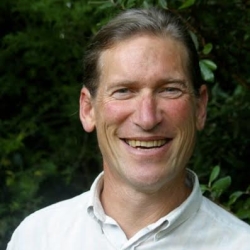In response to several articles that we have posted around David Holmgren’s latest important essay, Crash on Demand (see MacLeod, Heppenstall, Hopkins, Poyorouw, Bates, and Orlov) we are now pleased to be able to post the original essay with David’s permission. We will be reposting this essay in three parts. This is Part 1.
Introduction
This essay updates my Future Scenarios (2007)[1] work but also builds on the essay Oil vs Money; Battle for Control of the World (2009)[2], as a running commentary on the rapid changes in the big picture context for permaculture activism, especially in the Australian context. It assumes understanding of these previous works and, of course permaculture. ‘Preaching to the choir’ it may be, but hopefully it contributes new perspectives to keep permaculture activists ahead of the game.
Permaculture teaching and activism have always aimed to work with those already interested in changing their lives, land and communities for the better, rather than proselytising the disinterested majority. Over many decades, idealistic youth have responded positively to the ‘can-do’ personal empowerment of permaculture design, but it has also attracted more experienced citizens disillusioned with top down mainstream environmentalism’s failure to stop the juggernaut of consumer capitalism. Similarly, disillusioned social and political activists are just starting to recognise permaculture as a potentially effective pathway for societal change as 20th century style mass movements seem to have lost their potency.
My argument is essentially that radical, but achievable, behaviour change from dependent consumers to responsible self reliant producers, (by some relatively small minority of the global middle class) has a chance of stopping the juggernaut of consumer capitalism from driving the world over the climate change cliff. It maybe a slim chance, but a better bet than current herculean efforts to get the elites to pull the right policy levers (whether by sweet promises of green tech profits or alternatively threats from mass movements shouting for less consumption).
My argument suggests this could happen by reducing consumption and capital enough to trigger a crash of the fragile global financial system. This provocative idea is intended to increase understanding while taking the risk that the argument could turn people away from permaculture as positive environmentalism, and brand me a lunatic, if not a terrorist. That risk is an analogy for the massive risks that humanity now faces, where all options have unintended consequences and that normal, apparently sensible, behaviour is just as likely to lead to disaster as the most apparently mad schemes. Even mainstream ‘responsible’ proposals for saving us from climate chaos could also crash the financial system. In times of tumultuous change, small events may trigger big changes we can’t control; a key understanding from the permaculture principle Creatively Use and Respond to Change.
Speculations of Alternative Technology and Permaculture Pioneers
Ten years ago I had a visit from colleague Peter Harper[3] from the Centre For Alternative Technology, during which we had a ‘debate’ about Peak Oil and Climate Change. Peter was of the opinion that humanity was facing a climate emergency that required consideration of every available option. I thought that Peak Oil would have a much faster impact on the world economy, and should save us from the climate cooker through economic contraction, even if the consequences for the economy and society could be severe. My thinking reflected a strongly held view that the long-term future for humanity was one of energy descent, which we had to gracefully accept and adopt as a positive future.
From my perspective, Peter was somewhat reluctantly accepting the need to use technology and large-scale institutions (associated with global capital and government) to ward off the climate catastrophe. While Peter did not think nuclear power was a solution, his views had some similarity to other leading environmental communicators such as George Monbiot who have supported nuclear as necessary in dealing with the climate emergency. During another of Peter’s visits in 2007 I noted to him that the evidence from the Arctic was far worse than anyone had previously suggested, while he admitted that oil production seemed to be in serious trouble.
In Future Scenarios (2007) I outlined four potential energy descent scenarios that could emerge over the following 10 to 40 years, globally and/or locally. I saw climate change and peak oil as the primary drivers, but the symptoms would be geopolitical, economical and psychosocial. Since that work was completed, a host of rapid changes and novel factors has complicated the picture.
1. The global financial crisis and sovereign debt crisis in Europe, political turmoil and hardship in southern Europe
2. Rapid expansion of the energy and resource industries through mega projects on an unprecedented scale.
3. Rapid growth in biofuels, high food prices and dwindling global grain stocks.
4. Failure of intergovernmental climate and trade negotiations.
5. A series of mega natural disasters colliding with manmade catastrophes such as the 2011 earthquakes, tsunami and nuclear accidents in Japan.
6. The securitisation of everyday life, such as integration of emergency management functions within national security, rather than human or community security operational frameworks.
7. The Arab spring, regime change and wars in North Africa and the Middle East.
8. The surveillance state, repression of dissent and cyber wars between nation states and sub national players.
The reasons behind these and other current events are complex, but they should all be recognised as being driven at least in part by energy and climate.
Peak Oil: real, but not quite catastrophic
As I expected, the linkage between these events and the more enduring drivers of Peak Oil and Climate Change is generally misunderstood or ignored in the mainstream media that habitually focuses on the minutia of arcane but defunct economic theories on the one hand, and tribal stories of good and evil, informed by ideology and culture on the other. The propaganda about Peak Oil being defeated by the resurgence in the American energy sector has been more than adequately rebutted[4] but prevails as a fantasy to keep masses of Americans, if not other peoples, hopeful of better times ahead. In my view, the signature of Peak Oil in most of the above symptoms is stronger than that of climate change (so far), reflecting my position in the debate with Peter Harper.
On the other hand, those factors have not played out as I expected, with an undulating plateau in oil production and massive economic stimulus, moderating, if not avoiding, severe global economic depression (so far). Consequently the massive reduction in greenhouse gas emissions (GGE), which I was expecting has not happened (so far). The rapid collapse (10% decline rate) in oil production due to geological factors now seems less likely, partly because the sustained high energy prices (around $100/barrel) have allowed private and national energy corporations to put in place many new fossil and renewable energy projects that are moderating the impact of the decline in production from ageing “super giant” fields. Along with a massive expansion in coal burning, most of these new energy projects directly or indirectly accelerated greenhouse gas emissions. For example tar sands, ultra deep oil, and shale gas all generate far more greenhouse gases than the conventional sources they have replaced. Biofuels have indirectly used fossil fuels or impacted soil and vegetation carbon at levels that ensure no net reduction in GGE in many cases.
When we look at the global situation through the lens of the Future Scenarios framework we can see that the substantial substitution by non-conventional oil and gas has compensated for the significant declines in conventional oil production since 2005 to the present, setting the conditions for less severe “Green Tech” and “Brown Tech” scenarios. Importantly, there is strong evidence that the global financial crisis (GFC) and resulting sovereign debt crisis, has marked the beginning of the end of global economic growth.[5] If this is the case then the now well-established contraction in consumption of resources[6] in many overdeveloped economies will allow supply to more closely match demand for oil and resources generally. In a macro system sense, economic contraction and the breakdown of established middle class consumption, are the adaptive processes by which humanity is dealing with declining net energy availability.
Climate; from bad to worse
While the Peak Oil scenario appears more moderate than the worst predictions, the situation with climate change seems to be at the extreme end of scientific modelling. Greenhouse gas emissions increasing faster than the worst-case scenarios have combined with the almost complete failure of international agreements to limit future emissions. This situation has made “dangerous climate change” a given and raised the spectre of more severe impacts. Beyond the modelling, it has been the increase in droughts, extreme weather events, and the astonishingly fast disappearance of Arctic sea ice that have provided the clearly recognised markers of climate change in action.
The dip in global emissions created by the 2008 GFC was ignored by the climate activist community[7] as an inconvenient truth. Following the failure of the Copenhagen climate summit, I critiqued the alignment of the climate activist community with the masters of finance and against the resource industries as a naïve alliance.[8] While the bubble economy of tradable carbon favoured by the bankers has not eventuated, Quantitative Easing has proved to be a substitute allowing the big banks to make money without risk of more bad debt, while the citizens accumulate unpayable private and public debt on an historically unprecedented scale. Economic contraction appears to be far worse than official statistics indicate, but the energy and resource sectors have remained relatively robust in response to stubbornly high prices and the continued availability of credit to support massive new projects. The continued access to credit is arguably the most important factor preventing a decline in energy supply.
The lower net energy return of new energy resources means the real economic benefits to society are far less than in the past, while greenhouse gas emissions (GGE) are much higher. This positive feedback of higher GGE despite economic contraction is the very essence of my Brown Tech scenario.

Brown Tech; here and now
So, a decade after our “debate” I have to concede that Peter Harper was right about the climate emergency, and that so far, Peak Oil has accelerated GGE through the rapid development of coal, non-conventional oil and gas along with the biofuel fiasco.[9] Maybe those discussions with Peter had a substantial influence on Future Scenarios because only 5 years after I wrote the scenarios I have come to the conclusion that the Brown Tech world (of Severe climate change but Slow decline in energy) is already emergent.
In Future Scenarios I mentioned financial instability and bubble economics as major factors reinforcing my primary analysis of the “Energy Descent Future”. I saw these factors, and the resulting GFC as symptoms of the more fundamental drivers of peak oil (and therefore peak net energy available to society). My focus on these geological and climate constraints beyond human control, had led me to underestimate the importance of how the complexity of the global financial system will, in the shorter-term, shape the future. In a recent interview about “Retrofitting The Suburbs[10]” I admitted that after decades focused on biological and energetic foundations for sustainable human culture, I had, in recent times become obsessed with money as a more short-term driver of the emerging energy descent future.
How we make the transition into contracting economies will determine how we deal with the intractable slower moving drivers of energy and climate. One of the great debates in peak oil circles has been whether Peak Oil would trigger hyperinflation or deflation. By 2008 the work of both systems analyst Nicole Foss,[11] and economist Steve Keen[12] had convinced me that deflationary economics would be (and already are) the most powerful factors shaping our immediate future.
I believe my characterisation (in “Oil vs Money”) of the most powerful agents of global capitalism being at war with each other is still useful, but this conflict has not stopped some weird synergy between heroic logistics of the energy harvesting industries and mad money schemes by central banks pushing the global economy into faster and faster overshoot. At the same time breathtaking forms of free money for banks and massive transfer of financial risk to the public from banks has kept the global financial system from collapse, but with worsening circumstances for the public in the most vulnerable nations, including previously affluent ones such as Greece.
My Green Tech scenario included an extended renewable energy boom stimulating rural and regional economies, part real- and partly bubble- economics. I imagined the Brown Tech scenario being driven by growth in fossil fuel and nuclear energy sectors directed by resurgent resource nationalist governments. In the USA, Australia, Canada and other countries still wedded to market solutions, we are seeing a mix of real but dirty wealth generating projects along with others (such as shale gas) that appear to be dirty without much in the way of real wealth.
In presentations and workshops on Future Scenarios I point out that different countries are predisposed to different scenarios. For example, New Zealand tends towards Green Tech because of relative insulation from the effects of climate change and having distributed wealth from agriculture, forestry and renewable energy. Australia on the other hand has been a candidate for Brown Tech as the most at risk from climate change among the OECD countries while being one of the emerging fossil energy (mostly coal and gas) superpowers. With rapidly increasing energy and resource exports, expanding population and consumption, plus increasing reactionary politics, Australia shows many of the signs of the Brown Tech scenario. All it will take is economic contraction to generate inequity and conflict. The bubble in house prices in Australia is arguably more extreme than in the US, Ireland or Spain at their peaks. This in combination with a drop in prices and demand for export commodities could easily trigger an extreme economic contraction that would generate the inequality and conflict typical of the Brown Tech scenario.
The final step to the Brown Tech world would be the shift from a market to command economy. While evidence around the world suggest the elites remain beholden to markets despite their gross failings (especially in finance), the likely increase in climate change induced natural disasters will force governments to take control. The ongoing nuclear crisis in Japan is a good illustration of the process.
References
[1] Future Scenarios; Mapping the Cultural Implications of Peak Oil and Climate Change
http://www.futurescenarios.org/
Future Scenarios; How Communities Can Adapt to Peak Oil and Climate Change, Chelsea Green 2008.
[2] See Holmgren Design website, http://holmgren.com.au/money-vs-fossil-energy/
[3] Peter is credited to have coined the term "alternative technology”, and has been the director of the Centre for Alternative Technology in the UK. See Peter Harper’s critique of permaculture in Cleaning out the stables (2003)
http://academia-danubiana.net/wp-content/uploads/2012/05/2.12.09.01_HARPER-A-critique-of-permaculture.pdf and its latest revision Big Rock Candy Mountain (2013)
http://www.thelandmagazine.org.uk/sites/default/files/The Big Rock Candy Mountain.pdf
[4] See The Oil Drum analysis Is shale oil the answer to peak oil? by Gail the Actuary
http://www.theoildrum.com/node/7499
and Three nails in the Coffin of Peak Oil by Euan Means
http://www.theoildrum.com/node/10093
[5] See Heinberg, The End of Growth, New Society Publishers, 2011
[6] For example total Vehicle Miles Travelled in the USA has since 2007 been falling or flat (instead of always growing, as it has done almost every year since records began in 1947).
http://www.fhwa.dot.gov/policyinformation/travel_monitoring/tvt.cfm
[7] Since the formation of the IPCC in 1988 , a global network of dedicated individuals have been actively trying to get organisations from the UN and World Bank, to national governments, corporations, banks to act on climate change. While some of these people are typically activists working for NGO’s they also include scientists, politicians, bureaucrats, business leaders, entrepreneurs. These people have been interacting over such a long time and at such a large scale, that it is reasonable to use the term ‘community’ in the sense of having shared jargon, understanding and aims.
[8] See Holmgren, Oil vs Money; the battle for control of the world.
[9] Fiasco in several senses; firstly the adverse environmental impacts (e.g. increasing GHG emissions from rainforest clearing for palm oil), secondly the lack of economic viability with subsidy to unsustainable agriculture (e.g. corn in mid west of US), thirdly the failure of expected technological breakthroughs (e.g. cellulosic ethanol and algael biodiesal), fourthly failure to effectively understand how low net energy yield predicts likely lack of economic viability at the scale needed to replace a significant proportion of fossil fuel use.
[10] The Conversation: David Holmgren, co-founder of permaculture movement, broadcast in By Design program on ABC Radio National on the Boxing Day 2012.
[11] See the Automatic Earth website. http://theautomaticearth.com/
[12] See Steve Keen’s blog http://www.debtdeflation.com/blogs/
Acknowledgements
Thanks to Rick Tanaka, Maureen Corbett and Daryl Taylor for comments and corrections






